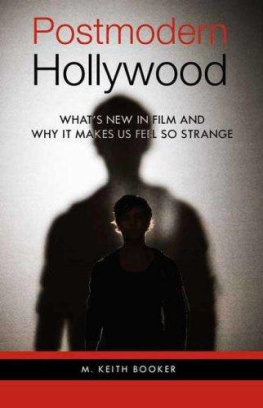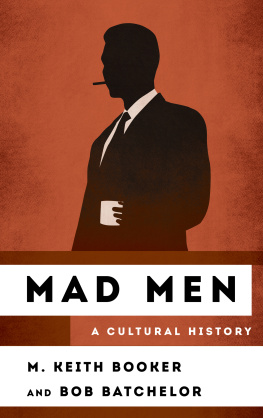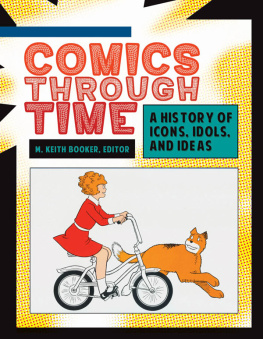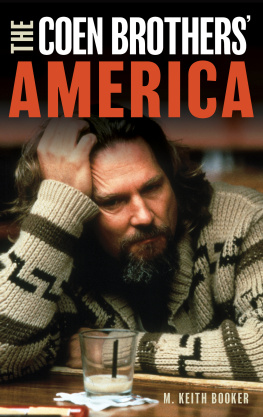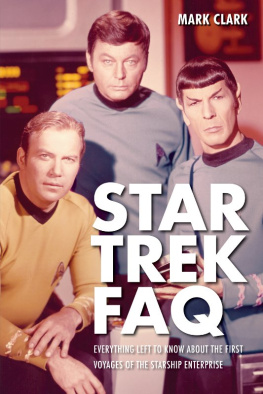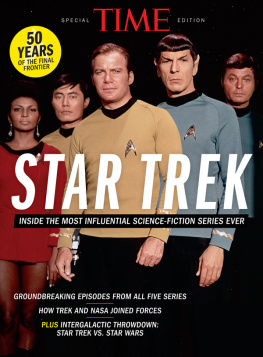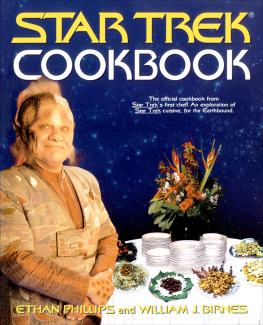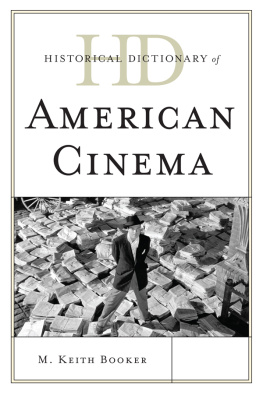M. Keith Booker - Star Trek: A Cultural History (The Cultural History of Television)
Here you can read online M. Keith Booker - Star Trek: A Cultural History (The Cultural History of Television) full text of the book (entire story) in english for free. Download pdf and epub, get meaning, cover and reviews about this ebook. year: 2018, publisher: Rowman & Littlefield Publishers, genre: Detective and thriller. Description of the work, (preface) as well as reviews are available. Best literature library LitArk.com created for fans of good reading and offers a wide selection of genres:
Romance novel
Science fiction
Adventure
Detective
Science
History
Home and family
Prose
Art
Politics
Computer
Non-fiction
Religion
Business
Children
Humor
Choose a favorite category and find really read worthwhile books. Enjoy immersion in the world of imagination, feel the emotions of the characters or learn something new for yourself, make an fascinating discovery.
- Book:Star Trek: A Cultural History (The Cultural History of Television)
- Author:
- Publisher:Rowman & Littlefield Publishers
- Genre:
- Year:2018
- Rating:5 / 5
- Favourites:Add to favourites
- Your mark:
- 100
- 1
- 2
- 3
- 4
- 5
Star Trek: A Cultural History (The Cultural History of Television): summary, description and annotation
We offer to read an annotation, description, summary or preface (depends on what the author of the book "Star Trek: A Cultural History (The Cultural History of Television)" wrote himself). If you haven't found the necessary information about the book — write in the comments, we will try to find it.
Star Trek: A Cultural History (The Cultural History of Television) — read online for free the complete book (whole text) full work
Below is the text of the book, divided by pages. System saving the place of the last page read, allows you to conveniently read the book "Star Trek: A Cultural History (The Cultural History of Television)" online for free, without having to search again every time where you left off. Put a bookmark, and you can go to the page where you finished reading at any time.
Font size:
Interval:
Bookmark:
Star Trek
The Cultural History of Television
Mad Men: A Cultural History, by M. Keith Booker and Bob Batchelor
Frasier: A Cultural History, by Joseph J. Darowski and Kate Darowski
Breaking Bad: A Cultural History, by Lara C. Stache
Star Trek: A Cultural History, by M. Keith Booker
Star Trek
A Cultural History
M. Keith Booker
ROWMAN & LITTLEFIELD
Lanham Boulder New York London
Published by Rowman & Littlefield
An imprint of The Rowman & Littlefield Publishing Group, Inc.
4501 Forbes Boulevard, Suite 200, Lanham, Maryland 20706
www.rowman.com
Unit A, Whitacre Mews, 26-34 Stannary Street, London SE11 4AB
Copyright 2018 by The Rowman & Littlefield Publishing Group, Inc.
All rights reserved. No part of this book may be reproduced in any form or by any electronic or mechanical means, including information storage and retrieval systems, without written permission from the publisher, except by a reviewer who may quote passages in a review.
British Library Cataloguing in Publication Information Available
Library of Congress Cataloging-in-Publication Data
Names: Booker, M. Keith, author.
Title: Star trek : a cultural history / M. Keith Booker.
Description: Lanham : Rowman & Littlefield, [2018] | Series: The cultural history of television | Includes bibliographical references and index.
Identifiers: LCCN 2018005381 | ISBN 9781538112755 (cloth : alk. paper) | ISBN 9781538112762 (electronic)
Subjects: LCSH: Star trek (Television program) | Popular cultureUnited StatesHistory.
Classification: LCC PN1992.77.S73 B66 2018 | DDC 791.45/72dc23
LC record available at https://lccn.loc.gov/2018005381
 TM The paper used in this publication meets the minimum requirements of American National Standard for Information Sciences Permanence of Paper for Printed Library Materials, ANSI/NISO Z39.48-1992.
TM The paper used in this publication meets the minimum requirements of American National Standard for Information Sciences Permanence of Paper for Printed Library Materials, ANSI/NISO Z39.48-1992.
Printed in the United States of America
For Isra Daraiseh, who knows how distant is the sky
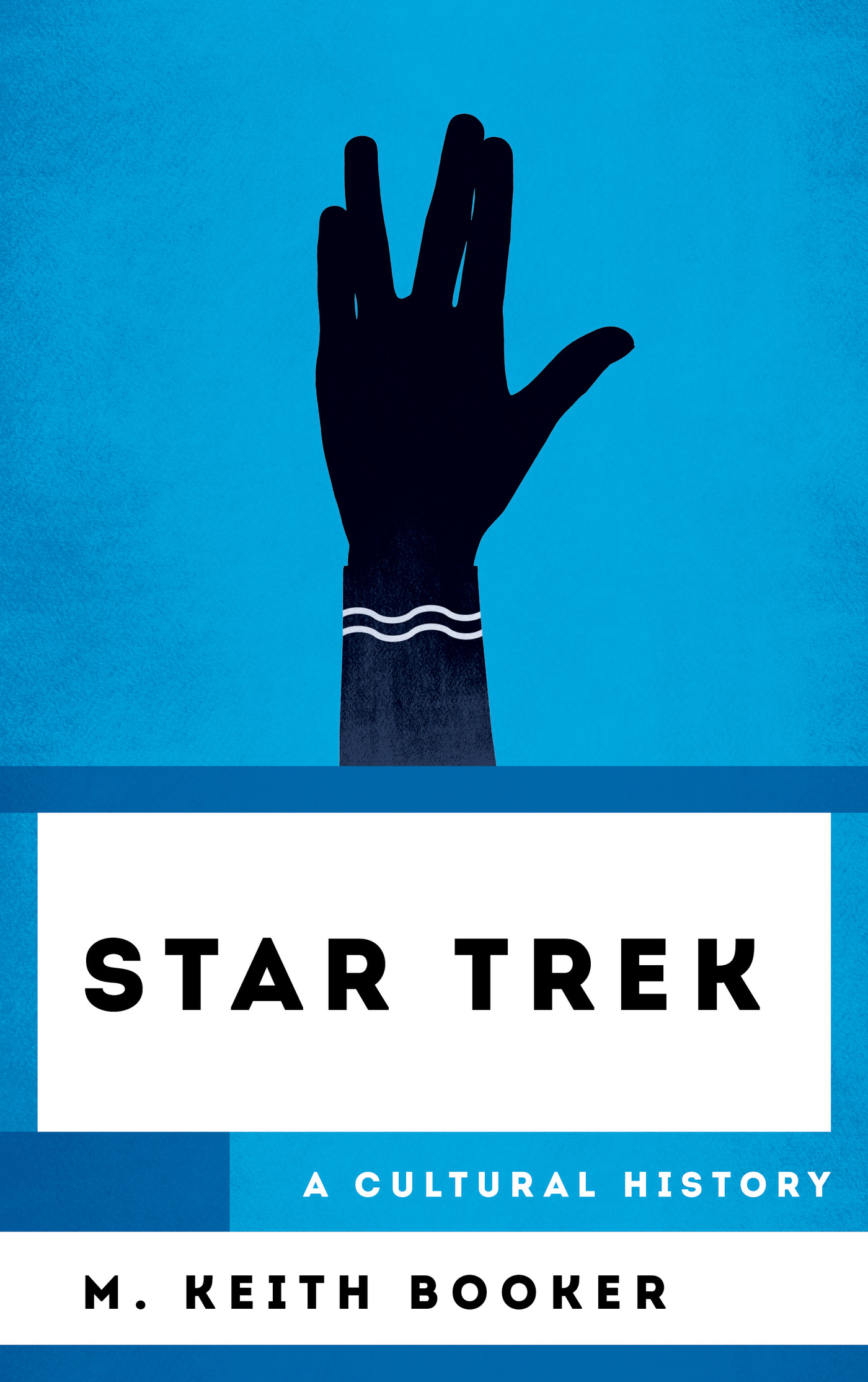
(with Abbreviations
Used in the Text)
Star Trek: The Original Series (TOS), 19661969
Star Trek: The Animated Series (TAS), 19731974
Star Trek: The Next Generation (TNG), 19871994
Star Trek: Deep Space Nine (DS9), 19931999
Star Trek: Voyager (VOY), 19952001
Star Trek: Enterprise (ENT), 20012005
Star Trek: Discovery (DSC), 2017
Star Trek: The Motion Picture (TMP), 1979
Star Trek II: The Wrath of Khan, 1982
Star Trek III: The Search for Spock, 1984
Star Trek IV: The Voyage Home, 1986
Star Trek V: The Final Frontier, 1989
Star Trek VI: The Undiscovered Country, 1991
Star Trek: Generations, 1994
Star Trek: First Contact, 1996
Star Trek: Insurrection, 1998
Star Trek: Nemesis, 2002
Star Trek, 2009
Star Trek Into Darkness, 2013
Star Trek Beyond, 2016
Star TrekPast, Present, and Future
The original StarTrek television series, which ran on NBC for a mere three seasons from 1966 to 1969, would go on to become arguably the single most important work ever produced by American popular culture. This seriesnow often referred to by fans and critics as TOS (for TheOriginalSeries)addressed serious issues and ideas in a way that had seldom been seen on American television, while boldly taking viewers on outer-space adventures in parts of the galaxy where no one had been before. Moving into immediate syndication after its original broadcast run, TOS developed a cult following, becoming more and more popular in the subsequent two decades, until its audience finally began to fade slightly only after the premiere of its own sequel series, Star Trek: The Next Generation (TNG), in 1987. In fact, the original broadcast run of TOS proved to be just the tip of a multimedia iceberg, spawning a wide range of products that were eagerly consumed by a fan base that continued to grow in both size and enthusiasm over the next half century.
In addition to its own reruns in syndication, TOS and its vision of a high-tech, socially enlightened future inspired the most extensive and impressive sequence of sequel and prequel series in television history, from Star Trek: The Animated Series (19731974, often abbreviated herein as TAS) to Star Trek: Discovery, which premiered on the CBS All Access streaming video service in September 2017. TOS also became the inspiration for one of the most important film franchises in the history of American cinema, at this writing comprising thirteen films, beginning with Star Trek: The Motion Picture (TMP) in 1979 and extending through the three reboot films produced by J. J. Abrams from 2009 to 2016. Along the way, the ideas, events, and characters of TOS became the inspiration for a series of novels and comic books, as well as the center of one of the most important fan cultures in the history of fandom, paving the way for (and continuing to be a crucial part of) todays ubiquitous culture of conventions, cosplay, and merchandising.
No one, given the inauspicious beginnings of the original Star Trek series, could have predicted this ultimate degree of success. Not only did the series, from its beginnings, have trouble drawing enough ratings to stay on the air, but it had significant difficulties getting on the air in the first place. When presented by series creator Gene Roddenberry (via Desilu Productions, with whom Roddenberry had signed a development deal) first to CBS, the idea for the series was turned down altogether. NBC was interested enough to commission a pilot in 1964, scenes from which would later be edited into the first-season two-part episode The Menagerie (November 17 and 24, 1966). The pilot itself was rejected by NBC, but the network was sufficiently intrigued to order a second pilot, with only one character, the now-iconic half-Vulcan Mr. Spock (Leonard Nimoy), carried over from the first pilot to the second. Only Nimoy and Majel Barrett (who would remain a presence through most of the subsequent series and films as the voices of the ships computers) were carried over from the original cast. This second pilot clicked with NBC management, and the new show was ordered by NBC for the 19661967 season, setting in motion a cultural phenomenon whose significance would resonate through the decades.
In retrospect, though, it is easy to see why StarTrek had so much trouble getting on the air. The series was simply unlike anything that had been on television beforeand television executives are notoriously hesitant to air anything genuinely new or unfamiliar for fear of alienating viewers or (more importantly) sponsors. That was probably even more the case when Roddenberry began to try to sell the series back in 1963, a scant two years after Commissioner Newton Minow of the Federal Communications Commission (FCC)in a speech delivered at a 1961 meeting of the National Association of Broadcastershad famously declared the content of American commercial television to be a vast wasteland, consisting essentially of a nonstop stream of mindless programming, punctuated by even more mindless commercials.
Font size:
Interval:
Bookmark:
Similar books «Star Trek: A Cultural History (The Cultural History of Television)»
Look at similar books to Star Trek: A Cultural History (The Cultural History of Television). We have selected literature similar in name and meaning in the hope of providing readers with more options to find new, interesting, not yet read works.
Discussion, reviews of the book Star Trek: A Cultural History (The Cultural History of Television) and just readers' own opinions. Leave your comments, write what you think about the work, its meaning or the main characters. Specify what exactly you liked and what you didn't like, and why you think so.


